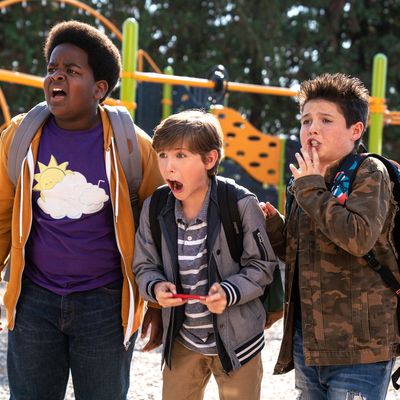
Good Boys takes one of the most familiar subgenres of our time — the adolescent horndog coming-of-age comedy — and slyly subverts it with one crucial twist. This time, the kids are really young, so they’re even more clueless than the hormone-addled besties of films like Superbad or The To Do List. If that idea makes you cringe … well, it probably should, but somewhere in that discomfiting liminal space between shocking and adorable the movie finds untold reserves of humor. The image of a 12-year-old-boy practicing kissing on his friend’s parents’ CPR doll is charmingly dorky. But what’s your response when you know that the parents’ CPR doll is actually the parents’ blow-up sex doll, and the boy’s post-kiss observation is that the thing’s mouth is “sticky”? Some will laugh even harder. Some might want to leave the theater and file a lawsuit. I stayed and laughed. It’s funny because it’s abominable.
The story, as is often the case with these coming-of-age raunch-fests, occurs over the course of one day, as Max (Jacob Tremblay), Lucas (Keith L. Williams), and Thor (Brady Noon) — who collectively call themselves “the Beanbag Boys” — find themselves invited to a party hosted by the school’s resident cool kid, Soren (Izaac Wang), and realize they have to get some experience fast before they go. There are going to be girls there, see, and it’s going to be a “kissing party,” and none of these kids has ever kissed a girl before, so they have to figure out how to do so, which for some reason involves flying Max’s dad’s (Will Forte) prized drone over a neighboring teenager’s pool to watch her make out with her dopey college boyfriend. Look, it sounds stupid to me too when I type it out like that, but it’s a testament to Gene Stupnitsky’s observant, easygoing directing style that I totally bought this plot device during the actual movie. Part of the fun of this sort of thing is seeing someone hatch a plan that is beyond stupid, and then guessing all the ways that it will unravel, and then (hopefully) marveling at the entirely new levels of calamity that the filmmakers are able to conjure.
The title Good Boys is not meant to be ironic; the Beanbag Boys actually are good, well-behaved kids. They do what their parents tell them. They’re afraid to stray too far from their neighborhood. They say no to drugs. They refuse to lie. (“All we have to do is go there and tell them the truth, then God will be on our side,” Lucas says during one particularly morally thorny moment.) They are also clueless. They think girls stick tampons up their butts to keep babies from coming out. They think a feminist is someone who hates women. They can’t open childproof pill bottles. The joke is that their goodness, combined with their cluelessness, keeps getting them in bigger trouble.
That’s also why Good Boys manages to find surprising pathos within its simple concept. It’s been crafted with a real sense of character psychology. These kids are at that age when everybody’s developing differently. So, Max is discovering girls and pines for Brixlee (Millie Davis), a kindly classmate who looks like she might reciprocate, but who also seems even shyer than he is. Thor is not nearly as interested in girls; he’s more obsessed with fitting in among the cool boys at school, while also singing in the school play. (Thor also has the voice of an angel, which at this age is more problem than asset.) Lucas, meanwhile, is really into video games and food and God, and looks like he could already be in high school; when they try to infiltrate a fraternity, one of the college kids “recognizes” him from class.
The laughs are effective — gross, yet clever — but the movie becomes funnier, and in some ways sadder, the more the jokes play off the kids’ inner lives. When Lucas informs his friends that his parents are splitting up, Thor asks, matter-of-factly, “So, what’d you do?” It’s the kind of awful question that children of divorce all know too well from the person inside their heads who’s always peppering them with hurtful questions and observations. Now, that inside voice has gone and made a movie, along with all the other inside voices we have when we’re young. Good Boys knows how to make us laugh because it knows the people we once were, and maybe still secretly are.


